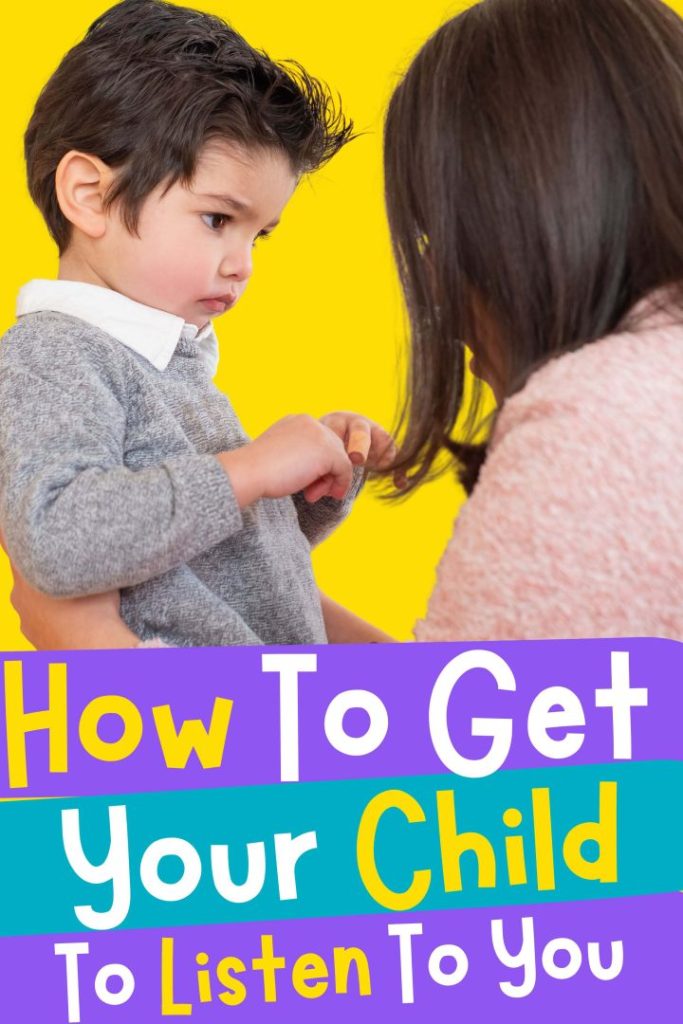One of the most frustrating things with your child is when they refuse to listen. When you have to repeat your request over and over again until finally you’ve reached your limit of calm and start yelling.
So many parents experience this, and after the yelling outcome the child is frustrated, you feel bad, and no one feels like it was a win even if the request is fulfilled because you all feel awful.
So, why does it keep happening? And how can we improve this situation?
Why Your Child Does Not Listen

Psychology is a great tool for learning behaviors. According to Psychology Today, there are reasons for your child not listening. These include,
- Your child feels disconnected.
- Your child does not want to stop what they are doing.
- They didn’t hear you.
- They do not have a grasp of time, not completely.
- Your child simply doesn’t want to do it.
- They can’t remember multiple instructions.
- They would rather do something else.
- Your child has been conditioned to wait until you yell.
- They don’t want to be reminded.
- The child feels judged by the language and repeated requests.
- You don’t listen to them, so they don’t want to listen to you.
- You don’t understand each other’s needs.
- Your child wants autonomy.
According to psychology, the need for autonomy is the most common reason for not listening. Although our children do not deal with the adult issues that we have on the daily, it doesn’t mean that their issues are not important. It also doesn’t mean that they shouldn’t have even just some control of their life to help them with their need for independence.
In their world, the issues they deal with are very important. And by prioritizing them we can help our kids see that we understand and care about their problems.
Parenting Techniques to Help Get on the Same Page

All is not lost; it is never too late to find a method that works for you and your child. Parenting expert Amy McCready, shows that there are techniques and things to do to get you guys on the right path for a child to listen.
- Get to the root of the behavior.
- It’s time to play detective with your child here. There is always a reason for why a child acts the way they do whether they or even we, know it or not.
- Be consistent.
- Using consistency will make life easier for you and your child. In an inconsistent environment, children may not always know what is expected of them, or the consequences of their actions. Establishing routines can really help with that.
- Say no to rewards.
- Many studies have shown that when kids are repeatedly rewarded they lose interest in the activity that they are being rewarded for.
- Focus on what you can control – yourself.
- Children have a mind of their own and free will. One day they will be adults who control each aspect of their lives. Realize that the tools needed for our children to behave start with being taught the correct tools by their parents.
- Discipline doesn’t punish.
- Discipline means to teach by instruction, and punishment is to inflict a penalty on. By disciplining them we can empower them to be better.
Steps to Get Them to Listen

Besides the techniques mentioned above, parenting expert Amy also gives us tools to help get your child to listen.
- Get on their level.
- Yes, literally bend over and get on their level when you need their attention. This will make looking them in the eye easier and strengthen communication.
- Do away with don’t.
- By telling them what not to do, you’ve given them two questions to answer.
- What do I not do?
- What am I supposed to do instead?
- Instead, tell them what to do. Instead of “Don’t touch your brother” say “Your brother doesn’t want to be touched right now. Keep your hands to yourself please.”
- By telling them what not to do, you’ve given them two questions to answer.
- Say yes to “yes”.
- No can be a constant go-to answer. So, it is no wonder that our kids don’t want to comply with our requests. This isn’t to say to let your kids have the run the house. But you can give them small wins.
- Shorten your speech.
- As a mom, I am guilty of trying to turn behaviors into lessons. Of course, they should be but the more you talk, the less they will listen. Be as concise as you can, and they won’t be able to tune out.
- Say “thank you” in advance.
- Thanking your child before they do a task is much more motivating than telling them what they need to do and having that be the end of it. It will cultivate more open communication as well.
- Ensure comprehension.
- This is something I practice often. When I tell my children a task needs to be done, or something isn’t okay I have them repeat it to me. There have been studies that show increased retention of information upon practicing this.
- Make an observation.
- If you notice something that needs to be done then observe it. “I see that your shoes are in the middle of the floor.” Our parenting expert Amy uses another strategy. “What is your plan for?”
- In the shoe example, you can say, “What is your plan for the shoes in the middle of the floor?”
Final Thoughts
Being a parent is challenging, especially when we need to control our own emotions to help our children deal with theirs. We are all human trying to find our way through life, and this is no different for our kids. The difference between us and the kids is that we can teach them and give them the tools that we need.
Let your child have some control, even over something they would rather not do. Any choice that can be given to them will make the task less undesirable. They will have a feeling of some control over their lives. If the task is to take out the garbage, give them the choice of when to do it. Within an appropriate time. Asking them for help also makes them feel useful.
ALSO READ: At What Temperature to Wash Baby Clothes







